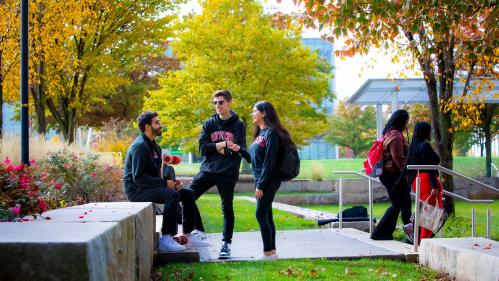Academic Technology Advisory Council
Academic Technology Advisory Council
Academic technology is a critical element in the effective delivery of educational content across the university. The successful delivery of core academic technology functionality requires regular community engagement, effective shared governance, and thoughtfully standardized processes that support unit-level and university strategy. The Academic Technology Advisory Council (ATAC), co-convened by the Office of Information Technology and University Academic Affairs, serves as a collaborative university-spanning venue for stakeholders to identify academic technology needs, provide strategic direction for the ecosystem, and support teaching and learning with technology for the university community.
GUIDING PRINCIPLES
- Cultivating a Positive Learning Experience - Teaching and learning should be enhanced by technology, not encumbered by it. Academic technology should support student success. Student learning comes first, technology second.
- Effectiveness & Efficiency - Academic technology should be reliable, cost-effective, efficient, and avoid duplication where possible, while also ensuring the needs of instructors and students are met.
- Coordination & Cohesiveness - Coordination across academic and supporting units should foster a unified framework to guide academic technology use across the university.
- Inclusivity & Transparency - Faculty, students, and staff should be invited to provide regular input through working groups and surveys to ensure that academic technology meets the needs of both the community and individual stakeholders.
COUNCIL SCOPE
- Strategic Leadership - The council will be responsible for advising university leadership on the strategic matters related to the academic technology ecosystem.
- Technology Evaluation & Adoption - The council will continually assess the university’s digital teaching and learning needs, facilitate the evaluation and selection of enterprise solutions, and advise on the implementation, transition, consolidation, and sunsetting of academic technologies.
- Administrative Input - The council will provide guidance on the administration of enterprise academic technology.
- Policy Recommendations - The council will assist in the development and implementation of policies, guidelines, and best practices related to academic technology, ensuring an equitable, safe, and compliant digital learning experience for our students and faculty.
- Major Projects & Initiatives - The council will lead or participate in universitywide projects and initiatives related to academic technology and digital instruction, such as:
- Ethics, Compliance & Accreditation - The council will collaborate with university leadership, governing bodies, and oversight committees to review, as necessary, legal and/or ethical issues related to the use of academic technology.
- Emerging Technologies & Innovation - The council will monitor current trends and foster a culture of innovation to promote an efficient, effective, and cutting-edge academic technology ecosystem.
- Collaboration with Consortia - The council will serve as a hub for the university community to explore and engage with higher education consortia such as Unizin, EDUCAUSE, and the Big Ten Academic Alliance (BTAA).
List of Participants and Executive Sponsors
Charles Collick
Associate Director of Information Technology
IT Accessibility & Learning Technology
Office of Information Technology
Co-Lead
Kathy Zimmerman
Associate Vice President for Student Access and Success
University Academic Affairs
Co-Lead
Barbara Gladson Demarco
Senior Associate Dean for Education
Associate Dean for Academic Affairs
Professor, Pharmacology & Physiology
Rutgers Health
Kevin Dowlin
Assistant Vice-Chancellor for Technology, Innovation, and Learning Environments
Rutgers–Newark
Carly Hart
Director, Instructional Design & Technology
Rutgers–Camden
Hussein Issa
Associate Professor of Accounting
Rutgers–New Brunswick
Diane Jammula
Associate Teaching Professor of Physics
Rutgers–Newark
Timothy Knievel
Assistant Teaching Professor, Political Science
Rutgers–Camden
Laura Liang
Senior Associate Dean for Academic Affairs
Associate Professor, Health, Behavior, Society and Policy
Rutgers Health
Joy McDonald
Associate Director, Academic Technology Services
Rutgers–Newark
Carolyn Moehling
Senior Vice Provost and Vice Chancellor for Undergraduate Education
Professor of Economics
Rutgers–New Brunswick
Bill Olson
Manager, User Services
Office of Information Technology
William Pagán
Associate Vice President for University Online Education Services
Office of University Online Education Services
University Academic Affairs
David Pedersen
Director of MS in Finance-Financial Planning and Associate Professor, Finance
Rutgers–Camden
David Shreiber
Vice Provost of Academic Affairs and Professor of Biomedical Engineering
Rutgers–New Brunswick
Shankar Sundaresan
Associate Professor, Management
Rutgers–Camden
Christopher Valera
Associate Director, Enterprise Application Services
Office of Information Technology
Tracy Vitale
Interim Associate Dean of Clinical Affairs
Associate Professor, Nursing
Rutgers Health
Erin Bauzyk Vosseler
Associate Vice President, Health Sciences IT
Office of Information Technology;
Executive Sponsors
Michele Norin
Senior Vice President and Chief Information Officer
Office of Information Technology
Keena Arbuthnot
Executive Vice President for Academic Affairs and Chief Academic Officer
University Academic Affairs
